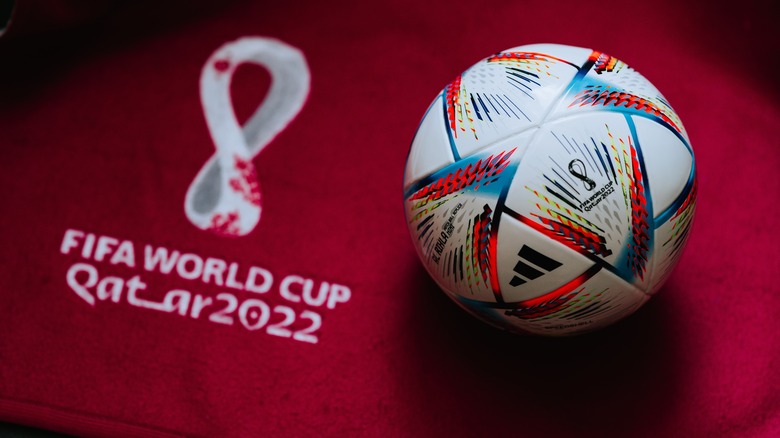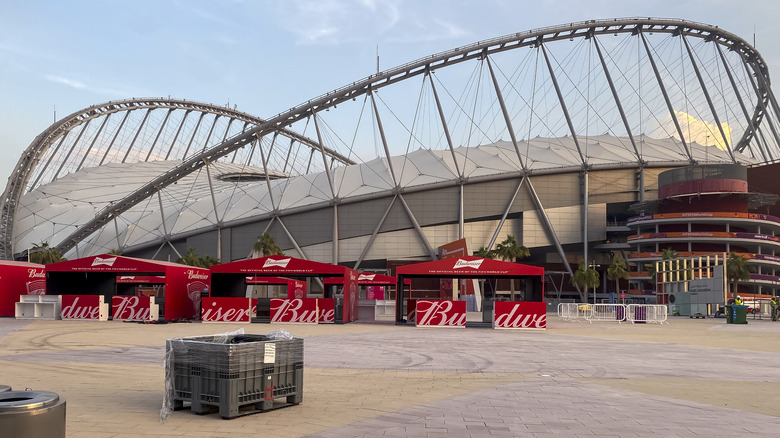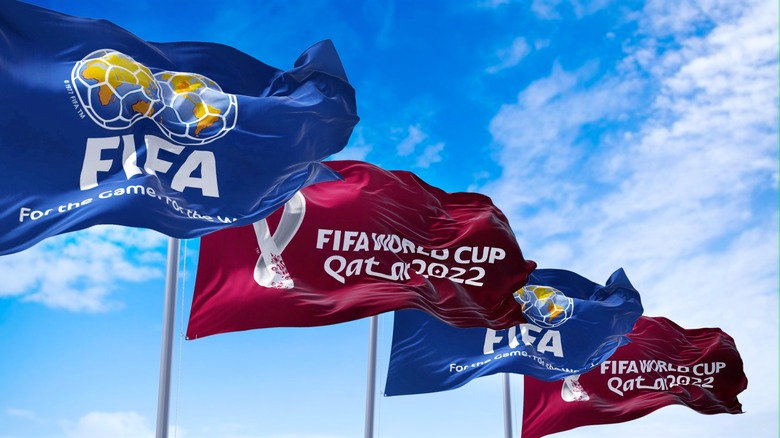What You Need To Know About The World Cup Alcohol Ban
Just two days before the opening match of the 2022 World Cup, FIFA issued a surprising last-minute proclamation. In a Nov. 18 tweet, football's global governing body announced that sales of alcohol would be banned in all stadiums following negotiations with the government of Qatar, this year's host country. The small nation on the shores of the Persian Gulf won the hosting rights 12 years ago, marking the first World Cup to ever take place in the Middle East. According to Bloomberg, Qatar has spent approximately $300 billion on preparations for the event.
The World Cup is always a high-pressure moment for the host country, as it inevitably thrusts the nation into the international spotlight. Bloomberg reports that more than a million football fans are expected to come to Qatar for the event, which is equivalent to a third of the nation's population. U.S. News reports that five billion people, more than half the global population, are expected to tune in via television. There is a lot on the line here in terms of reputation, and Qatar's eleventh-hour decision to ban alcohol sales could ruffle some very important feathers.
Alcohol will be available in a few select locations
Alcohol has been a point of contention ever since Qatar won the hosting rights to this year's World Cup. As The Washington Post points out, the Arab nation is an autocracy whose judicial system is based on Islamic Sharia law. Alcohol is not totally illegal, although it can only be served to non-Muslims, who must obtain a license to drink in their own homes. In September, the Associated Press reported that FIFA had worked out a deal that would allow fans to purchase beer — specifically Budweiser, which has been the official beer of the World Cup since 1986 — within the eight stadium compounds that are hosting matches this year.
That previously agreed-upon policy was abruptly reversed on Nov. 18, and Time reports that the order came directly from the Qatari royal family, based on concerns that "excessive visibility of alcohol would upset the local population and create security problems." Budweiser will now be sold at exclusive "fan zones" outside the stadiums, and only after 6:30 p.m. Each beer will cost 50 riyal ($13.73) for a half-liter. (If you want to drink something other than Budweiser, you'll need to pay over $22,000 for a stadium suite, where champagne, wine, and spirits are allowed.)
The ban could lead to legal action against FIFA
The ban on alcohol is likely to disappoint many tourists heading to Qatar for the World Cup, but their frustration pales in comparison to that of the Belgium-based AB InBev, owner of Budweiser, who Fox Sports reports paid $75 million to make its brand the official beer of the world's biggest sporting event. Budweiser had previously planned to open concession stands prominently displaying its logo. Last week, the company was told to move its stands to less-visible parts of the stadium complex, and in light of the newly-imposed alcohol ban, it will only be able to sell Bud Zero, a non-alcoholic option.
This could create a nightmare for FIFA, as the ban may constitute a breach of its contract with Budweiser. According to the Daily Mail, AB InBev has not announced any legal action yet. But soon after the ban was imposed, Budweiser's Twitter account posted a short statement simply saying, "Well, this is awkward..." The tweet has since been deleted.
The folks at FIFA aren't the only ones who could face legal action in light of the ban, either. Officials in the Qatari capital of Doha signed contracts stating they would "respect FIFA's sponsors." Only time will tell, but it seems the most intense competition of this year's World Cup could play out in court rather than on the field.


